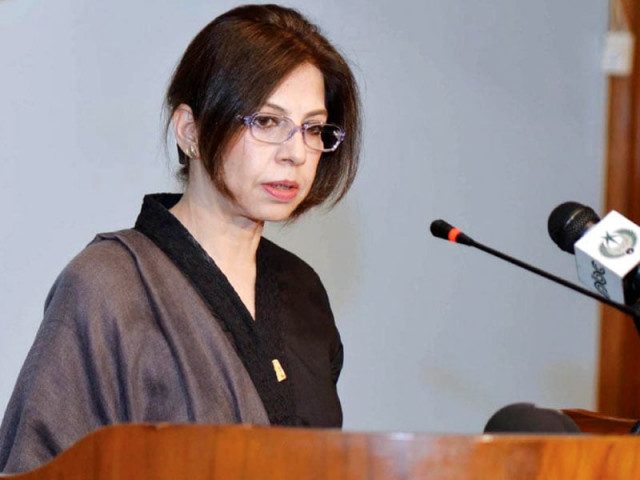Polio travel ban: These are recommendations, not restrictions, says FO
Pak-Iran pipeline to feature in Nawaz's upcoming visit to Iran. No alternative to composite dialogue with India yet.

Foreign office spokesperson Tasnim Aslam. PHOTO: INP/FILE
“These are recommendations that come under IHR regulations,” the spokesperson said during Thursday’s weekly briefing, before adding that the WHO has only put out an alert to pressure countries.
She said that polio issue has been under discussion with WHO since 2012 however there are difficulties that include security situation in certain pockets, threat of terrorism, attacks on polio workers, excessive focus on one type of vaccination – where as children require a cluster of nine vaccines. These factors have created some doubts about the agenda of polio eradication campaigns among certain people. She also referred to how Dr Shakeel Afridi had indulged in a fake campaign where UN agencies were also used which worsened the perception around the vaccination.
She added however that the government is trying to overcome the negative perception and that religious scholars have been involved in educating people.
Nawaz’s visit to Iran
On a question regarding Prime Ministers upcoming visit to Iran, the spokesperson said there will be discussion on specific proposals on economic cooperation and regional issues important for both countries, including the Iran-Pakistan pipeline.
She said that the Iranian interior minister had delivered a formal letter of invitation and held wide ranging talk with all aspects of our relationship, including terrorism.
The spokesperson, however, did not divulge details of the issue of kidnapped border guards featuring in the agenda.
“We hope that this would be very constructive and would open up more avenues of cooperation between our two countries.”
Composite Dialogue with India stalled
On questions about the Composite Dialogue process with India, the spokesperson said that the process is currently stalled, but Pakistan hopes it continues once a new government is formed in India after the elections.
She reiterated Prime Minister Nawaz Sharif’s speech at the recently concluded envoys conference where he had said Pakistan wants resolution of all outstanding disputes. “We need to overcome the problems that exist between Pakistan and India.”
Citing the government’s commitment towards regional economic development and “durable peace” between India and Pakistan, the spokesperson emphasised the need to resume the dialogue process.
“The resumption of dialogue is therefore, not a favour done by one country to the other. It is crucial for both.”
The spokesperson dispelled doubts that there was any proposal under consideration to move away from the Composite Dialogue process to resolve disputes with India, adding that Pakistan had not received any such proposal and that a format was in place.
Asked about the denial of visas to pilgrims wishing to visit Ajmer Sharif, the spokesperson hinted that this was a political move rather than the logistical issues mentioned by the Indian government.
“We were told that due to the elections, the local administration in Rajhastan was having difficulties in making arrangements for the pilgrims. However, our High Commission learnt through local administration and local politicians in Rajhastan that there was no such problem and they were prepared to receive the pilgrims.”
She added that the ministry had already protested against this violation of the 1974 bilateral agreement on visits to religious places by summoning the Deputy High Commissioner.
She added that the Ministry had pointed out that a pattern was emerging whereby Pakistani pilgrims were being denied the opportunity to attend Urs celebrations in prominent holy places that are covered by the 1974 agreement between the two countries. “We facilitate all Indian pilgrims coming to Pakistan and we expect full implementation of the agreement by India as well.”
“We find it very unfortunate and we hope that India will abide by its commitments under bilateral agreements,” she said.
Kashmir dispute
To a question about an Indian Minister’s comments made in response to the Chief of Army Staff Gen Raheel Sharif’s statements about Kashmir, the spokesperson said that Kashmir is a disputed area and that the dispute is recognised by the UN Security Council, adding that there were 20 Council resolutions on the dispute.
“Statements by Indian officials and politicians cannot do away with that fact,” she said, adding that Kashmir had been termed the jugular vein of Pakistan by Quaid-e-Azam Mohammad Ali Jinnah.
However, she said that Kashmir dispute, like other disputes with India, must be resolved. “People of Kashmir have long suffered.”
Pakistan sends emergency aid to Afghanistan
Pakistani government has sent emergency relief assistance for the affectees of landslide in Badakshan Province of Afghanistan. Two C-130 Flights have already delivered supplies including, tents, blankets, medicines, kitchen sets and essential food items on May 6 and 7. A third flight is due to depart shortly.
Relief is being coordinated through National Disaster Management Authority (NDMA), the spokesperson said.



















COMMENTS
Comments are moderated and generally will be posted if they are on-topic and not abusive.
For more information, please see our Comments FAQ